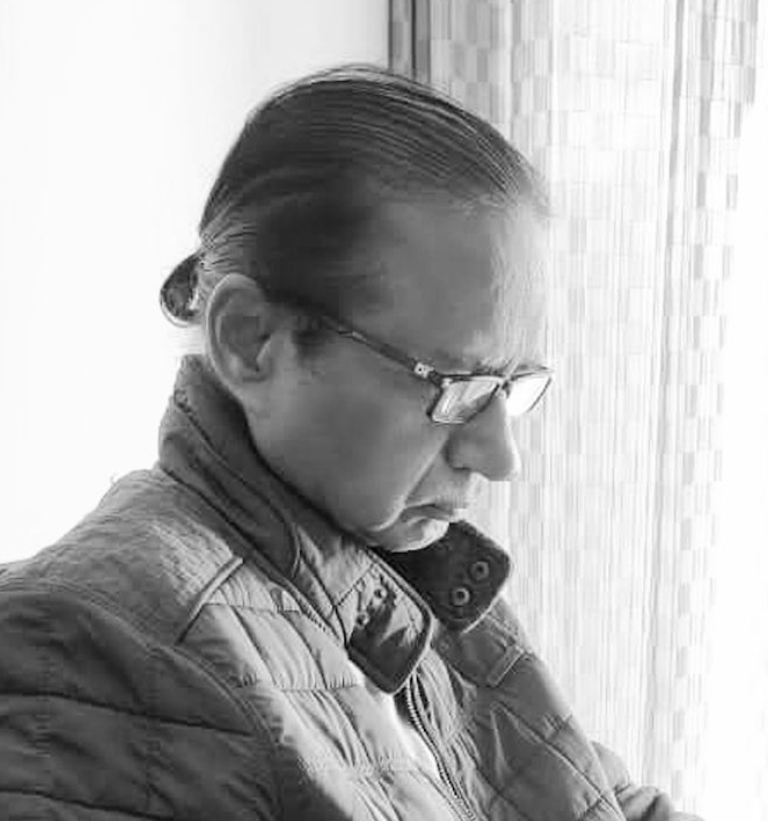Jayant Bhandari is an Indian who left India and settled in Canada. I never met him. He’s a Facebook friend. His posts generate thoughtful discussions and that’s how we both found each other in a good friendly relation.

I did try to leave Pakistan during my teen years, and failed. Later I abandoned the idea of leaving the country for obvious “reasons.” I wanted to do my bit to free our people from the pseudo shackles made of unfounded notions by the Riyasati Ashrafiya (ریاستی اشرافیہ) of Pakistan.
What is common between Jayant and I is the deep concern for the freedom, well-being and happiness of our respective people. And no doubt for the larger humanity too.
Early this January one post of Jayant attracted my attention. It was an excerpt from one of his articles: First World, Third World.
“Irrespective of the merit of what Trump did, those who think he has compromised the international order haven’t a clue that there is none. From the time of William Wilberforce, the international system is nothing but in the past, the fear of the UK, and in the modern times, the fear of the US. Forget the international system, the reason Africans haven’t culled all of each other is because their leaders feared eventual justice from the US. The reason China never lined up Tibetans or Uighur and shot them is because of the fear of the US. If Japan, Korea and Taiwan are sane, it is because of the US. If Kosovo and Chechnya still exist, it is because of the US. If there still are minorities left in Pakistan it is because of the fear of the US. And, yes, those who think India is a democracy because of the democratic instincts of Indians have no clue about the reality. India is democratic because a coup leader knows that the US would hold him accountable. Muslims, who blame the US for everything, have no clue that the reason >95% of them are alive is because of the US. So, no, there is no international order. There is merely the fear of the American barrel. Is it perfect? Not by any measure, but all the virtue-signalling societies, cults, and nations would all fall like a house of cards without the US.”
One may not agree with Jayant, but he has a point.
No doubt, there is no “international system,” and it’s the US, the topmost “rogue state,” the fear of which weaves a system and other rogue states fear it and remain in bounds. That’s like a method in madness, probably on its own. However, there’s more to this system. Despite that “American barrel,” sometimes the US too has to follow certain rules and certain values under the local or international pressures. Locally the US civil society and media are stronger enough and they succeed in turning the tide the US government happens to ride.
My initial comment on Jayant’s post was in the same spirit: “Those who don’t like the US, actually want to be another US, that’s their issue.” That’s a race, a vain race, let me add to it now.
Then a few days later I read the full article of Jayant. It’s good reading, and I chose to discuss what Jayant tries to say in between the lines. I posted my comment, and that started a conversation.
As I am not much interested in international politics, though try to keep myself abreast of it. My focus is Pakistan. That’s why I am very practical in my thinking.
Here is the conversation copied below verbatim:
Khalil Ahmad: Finally, I read the whole piece. Only one point, I would like to make: you despise Indian society, that’s fine. I used to do the same in case of our society. To me, more important thing is the state. I.e. Is the state fulfilling its constitutional role/responsibilities or not. Societies take time to change, and it’s the state’s engine that drags them forward towards change and enlightenment.
Jayant Bhandari: I don’t think so. You cannot have a decent government when the people are morons. In fact, from what I see in HK and Singapore, you actually don’t even need a government if the people are good.
KA: I feared that argument from your side. But that makes a vicious cycle. To me, for Indians and Pakistanis, the only way open and available is to make the state to play its constitutional role. Otherwise, your analysis implicitly suggests we ought to work for the dictators to be in power.
JB: This is never going to happen. Tell me how you are ever going to find a decent politician and how he is going to rise to the top?
You need a society that votes for good people, for good people to rise up.
Even in a dictatorship, you need a significant part of the society to be in favor of good people for good people to be able to do their job.
KA: I have no answer. How and where to find good, decent people. But please allow me to be personal. Aren’t you a good and decent person? Why can’t you take the first step? It may be the first step, very first drop of the rain. So, in your own case it was convenient to leave India, but you know you are rooted in India. So is my case. I decided to stay. You know what happened today in Pakistan, all the politics died … But I am not hopeless. I, or someone else, may be taking the first step.
JB: I can be good. I know some other good people as well. If I stand for elections, I will get five votes. Who will vote for me?
There is a libertarian party I favor in India. They got maybe a total of 100 votes.
Everyone votes for free-stuff or for their own community. I cannot offer free-stuff. People have no interest in me.
KA: No need to stand for elections. Form a political party to work as an institution.
Trust is won not in a day; it takes at least 2 to 3 decades. And that’s not a game of you come and you win.
JB: I have been trying to change people in India for the last 30 years. No success. Maybe one or two. That does not change anything. India had a libertarian party in 1950s. They vanished. There is a libertarian SB party. They struggle. They have been working for maybe 1 or two decades. No success. Maybe a 100 votes.
KA: Certainly, there is no key to success. One tries and errs and tries again. Also, it’s the political change that may last. Don’t believe in changing/educating/enlightening people. Vain task, it is. That’s why I left think tanking.
JB: The question remains… if you can change through the govt, how will you get into power? And think about yourself…. How many people you know who are honest enough to work honestly. My guess is if you know 2 people so far in your life like that you are lucky.
From Bengal to Pakistan, the history of India is of people with no moral values. None.
KA: It’s not an issue people are good or bad. They are both. And I believe in their moral substance; not for all the people, but most of the people. And there are moments in every country’s history when people are ready to change and bring change; but it’s politicians that wastes those moments. Most of the people want good moral life provided they are ensured justice, protection of their life and property.
JB: My view is that you don’t know another person who could be the Finance Minister. You cannot even form a team. And you are arm-waving how you can bring a change if a better government could be installed. You have no clue where these people will come from and how it will be installed. You then you have a fantastical idea that somehow a good government can put the country on the right path. Around you, you very likely fail to find a company that can manage a four people staff though. Because you are not in the driving seat (in the government), you can ignore 20 gorillas each weighting 250 kilos squeezed in a small room. So far, whatever you have said looks like fantasy to me.
KA: So, as you seem to be jumping over to my “fantasies” … let me mention your pessimism and somewhat hasty view of things. Nobody can have every detail of the path he is going to traverse open before him before he takes the first step. And as far as politics is concerned, we can equip ourselves only with principles and not this or that detail, or we can learn something from the experience of others. Also, I am not that much concerned with the quality of people, it is the message that may or may not inspire them and change them and permeate them with a purpose, and that’s how it may reveal itself. Or not. No doubt, there is no certainty to these things, but that should not stop anyone from taking the first step. My premise: If one finds there is none (though there may be many!) to do the requisite, one ought to go for it himself.
To others who are taking part in this conversation: At least my understanding of what Jayant and I are discussing is: In view of what’s happening in India and Pakistan, what should we (concerned persons) be doing.
JB: As I mention earlier, the only hope for Pakistan and India is first creating a critical mass of enlightened people, say 1%. This is what Raja RamMohan Roy was trying. Until then there is no hope. My view is that this is close to what Madhusudan is suggesting.
KA: What I am suggesting is another way of creating that “mass of people.”
JB: Assuming you have trying for a change for decades or two, how much has been your success? Based on this can we project where you might get to in the future?
KA: As for my think tanking, we succeeded a lot. When I started in, say 2000, the idea of market economy and personal freedom (fundamental rights) used to be outrightly dismissed in almost all the intellectual circles in Pakistan. With the passage of time, that political philosophy was accepted as a norm. And it created a whole constituency throughout Pakistan. Prior to the founding of the Alternate Solutions Institute, there were few pro-market people; now a large number exists. Also now exist 3 sort of Libertarian think tanks in Pakistan.
As for any political initiative, it’s yet to be put into practice. I entertain no ambition, no overnight acceptance, no immediate success. I want to do what I think should be done!
Jayant “Liked” this comment of mine. And in response to that, I posted this Thank you note:
Jayant Bhandari, and others.
Thank you for making all the points that brought in new insights, and I will keep them in mind, and certainly it’s been a productive discussion that may help us all to make productive moves. Thank you!
P.S.: Three others participated in the conversation; their comments have not been included here.
